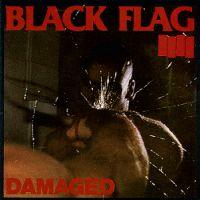Damaged stands as Black Flag’s definitive musical statement. It’s widely considered to be one of the best and most influential punk/hardcore LP’s of all time. If you were to start building a punk record collection from scratch, this would have to be among your first purchases. It’s also an album that bridges the gap between the Black Flag’s frantic early years and their more plodding later era. It shows a singer from an obscure Washington DC hardcore act becoming one of punk’s most enduring front men. It also shows the evolution of an iconic punk guitarist. Even though Black Flag had been around in one form or another for five years at that point, this was their first proper full length. It shows a maturing band with a sound well tested by heavy touring.
All the songs for Damaged were written before Henry Rollins joined Black Flag in 1981, but his delivery was so convincing that it was hard to believe he didn’t tear the lyrics from his own tortured soul. His biggest challenge had to be putting his own twist on some of those well worn tunes. Songs like “Rise Above”, “Six Pack”, “TV Party”, “Police Story” and “Gimmie Gimmie Gimmie” were practically already punk standards by this time. Hank’s versions were able to hold their own against any of the previous recordings. His solidifying of the vocalist position also allowed the band to go on an unprecedented run of creativity and productivity. Even without a writing credit, Rollins’ stamp is all over Damaged.
On Damaged, you started to see Greg Ginn for the visionary he was. No longer content to bash out power chords, he occasionally added atonal sounds and weird jazz chords to the mix. Ginn would go on to explore these things much further on subsequent releases, but it started in earnest here. With his instantly recognizable guitar tone already in place, his restless creative spirit was beginning to take shape. This was probably also the greatest collection of talent on a single Black Flag album. Rollins and Ginn were joined by key bassist and contributing songwriter Chuck Dukowski as well as second guitarist and former singer Dez Cadena. Throw in Robo on drums and it was an astounding amount of talent in one room.
In a lot of ways, Damaged felt like a tale of two different albums. The first eight songs are the most familiar and are fairly typical punk songs about empowerment, drinking, vandalism etc… Opener “Rise Above” literally exploded from the grooves. It was virtually impossible not to pump your fist in the air when you heard it. “Spray Paint” might have been the most memorable 30 seconds in punk history. Iconic bass riffs started the legendary alcoholic anthems “Six Pack” and “TV Party”. “Thirsty and Miserable” covered the same topic, and it was likely the ironic message was lost on many of the listeners. “Police Story” and “Gimmie Gimmie Gimmie” closed the first half of the album with a couple of Black Flag’s most frequently recorded songs.
The last seven songs felt like a man going through the stages of a nervous breakdown (although the track by that name is almost conspicuously absent). These songs gave a preview of the direction of a lot of Black Flag material to come. “Depression” and “Room 13” once again explode to start side two. “Damaged ll” has a sped up classic rock riff and a pulsating rhythm. “No More” started with a single bass note growing in speed and intensity until the rest of the music came bursting out. “Life of Pain” had a classic twisting Ginn riff and an abrupt ending. Closer “Damaged l” lumbered along like a behemoth. It was about as long and slow as anything the band had done to that point, and it really gave Rollins a chance to vent his spleen.
Production wise, Damaged was very raw. The twin guitars give the album a powerful drive, but the thickness often became a muddy mess. It could be a bit sloppy at times, but that only added to its timeless charm. If there’s any Black Flag album that deserves a remaster, it’s this one. It captured the band at the peak of their powers. Ginn and SST have done a good job of keeping the Black Flag material available, but it’s more than due for a sonic upgrade. Damaged would go on to become the blueprint for much of the punk and hardcore to come. It’s about as close as you’d dare get to punk perfection.
